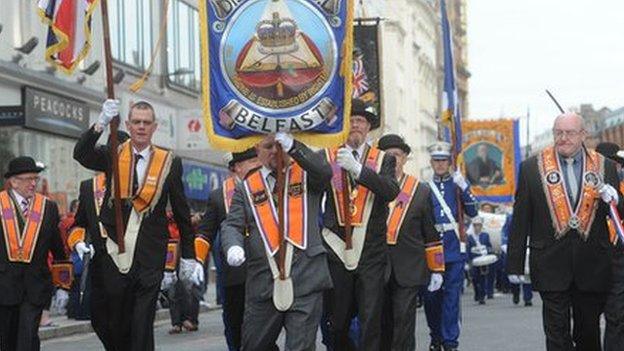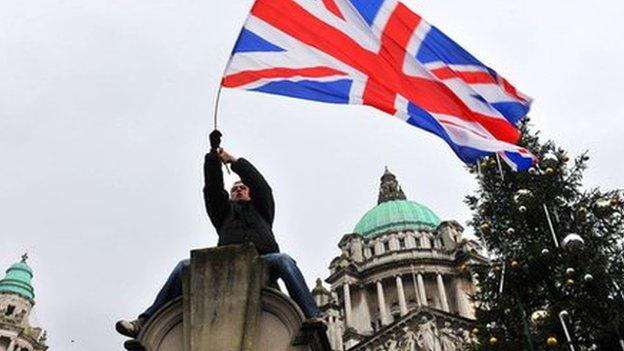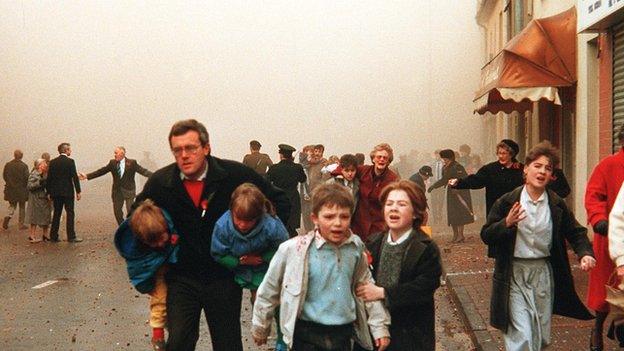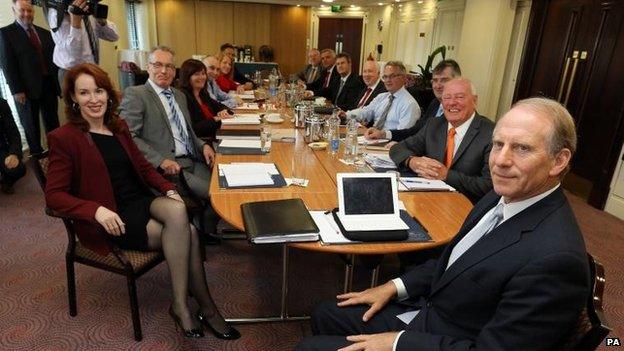NI talks issues explained: flags, parades, the past and welfare reform
- Published
Renewed talks have begun in Northern Ireland on how to deal with issues surrounding contentious parades, the flying of flags, the legacy of its troubled past and welfare reform.
But what exactly do those issues entail?

Parades

The majority of Orange Order parades are not contentious
Parades are an important part of life for many people in Northern Ireland.
The majority of parades that take place are connected to the unionist, or Protestant, community.
Most are organised by the Orange Order, external or other religious/cultural organisations, and the majority are not contentious.
The controversial parades are generally those that pass by, or through, nationalist areas.
Many nationalists feel that parading is an expression of historic unionist domination over nationalists in Northern Ireland.
Sinn Féin, external, the largest nationalist party, says that it does not seek to stop loyalists parading through nationalist areas, but that it should only happen after dialogue between marchers and residents.
Marching organisations believe that walking on the "Queen's highway" is a fundamental right.
A small number of nationalist parades have also proved contentious in the past.
In 1998, the UK government set up the Parades Commission, external to rule on contentious parades.
It has the power to impose restrictions or conditions on parades.
The Orange Order, except in a few isolated cases, has not engaged with the Parades Commission.
Unionist politicians have called for the body to be scrapped.

Flags

A man waves a union flag during a protest outside Belfast City Hall
Flags, and other symbols, are also important expressions of cultural identity in Northern Ireland.
Unionists and Protestants generally give their allegiance to the union flag.
They say that as Northern Ireland is part of the United Kingdom, the union flag is its national flag.
Most nationalists, or Catholics, would see the Republic of Ireland tricolour as "their" flag.
Tensions over flags were heightened in December 2012 when Belfast City Council voted to only fly the union flag from city hall and other council buildings on 18 designated days - previously it had flown continuously.
The decision was condemned by unionist politicians, and it sparked street protests, some of which were violent and led to the injury of more than 100 police officers.
The flying of flags, usually from lamp-posts, is also used by elements of both communities to mark out their "territory".

Dealing with the past

Eleven people died in the Enniskillen Remembrance Day bomb in 1987. More than 3,500 people died during the Troubles
It is believed that dealing with the legacy and aftermath of Northern Ireland's Troubles will be the most difficult issue to resolve.
More than 3,500 people died during the Troubles, and in almost 3,300 cases there were no prosecutions.
A Historical Enquiries Team (HET) was set up to review investigations of unsolved Troubles murders, but has itself proved controversial.
All political parties agree that the rights and feelings of victims should be at the centre of any process.
What the process should be, and exactly how a victim is defined, however, have proved almost impossible to agree.
Victims, as defined by the Victims and Survivors (Northern Ireland) Order 2006, external, are those directly affected by bereavement, physical injury, or trauma, as a result of the Troubles. The Victims Commission, external estimates that as many as 500,000 people could qualify under that definition.
Unionists, however, believe that those who committed, or were involved in, acts of violence should be excluded.
Nationalists also have concerns over alleged collusion between agencies of the UK government and loyalist paramilitaries.
A proposal from the Northern Ireland Attorney General, John Larkin, in November 2013, that there should be an end to Troubles-related prosecutions, was condemned by victims' groups and by most politicians.

Welfare reform and corporation tax
Northern Ireland is having to pay penalties to the Treasury for not implementing welfare reforms passed by Westminster in February 2013.
Sinn Féin has led the opposition to the reforms.
The Treasury's "fines" reflect how much the benefits budget in Northern Ireland should have fallen by if welfare reforms had been implemented.
Meanwhile, Chancellor George Osborne has told the parties that devolving corporation tax to Stormont depends on the outcome of the talks.
The current rate paid by businesses on their profits in Northern Ireland is 21%, compared to 12.5% in the Republic of Ireland.
The executive wants to be able to match the tax rate in the Republic to make Northern Ireland more competitive when it comes to attracting foreign investment.

Haass talks

Six months of negotiations were co-chaired by Meghan O'Sullivan (far left) and Richard Haass (far right)
Former US diplomat Richard Haass and Harvard professor Meghan O'Sullivan co-chaired six months of talks about the issues in 2013.
They had been brought to Northern Ireland by the first and deputy first ministers.
New Year's Eve was set as the deadline for agreement to be reached on their final draft proposals, external, but despite overnight negotiations involving the five main parties, the talks broke up without any resolution.
Sinn Féin and the SDLP endorsed the final proposals, but the DUP, UUP and Alliance rejected elements of the Haass blueprint.